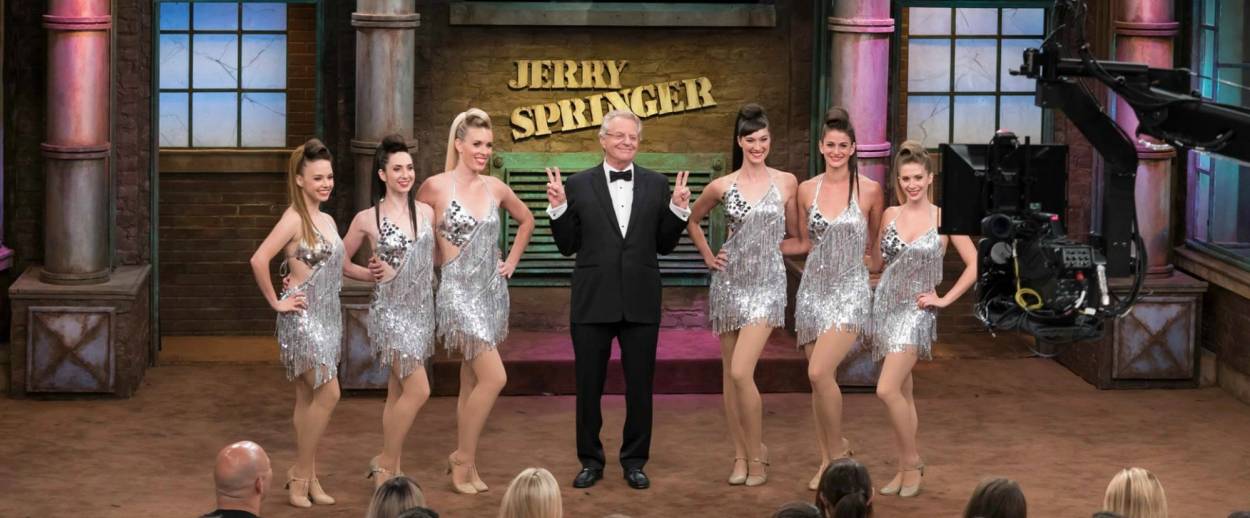A Tawdry Jubilee: ‘The Jerry Springer Show’ Turns 25
‘How in the world did we last so long? Let’s be honest, virtually anyone could do what I do’




Dressed in a tux, Jerry Springer, the king of trashy television, celebrated his show’s silver jubilee on Monday. That’s 25 years of paternity tests, adult babies, kung fu hillbillies, baby mamas, bronies (men who dress as ponies), cat fights, and sibling love triangles. To commemorate the occasion, Destiny the Stripper, sporting mile-high stilettos, emptied two bottles of champagne over herself while shimmying in a bathtub. “Here’s to 25 years, Jerry,” she said, doused in alcohol. Meanwhile, a revved-up audience chanted “Jerry, Jerry” in unison.
The man behind the microphone, the spectacle of this tawdry circus, the ringmaster himself—Jerry Springer— took it all in with a smile. But the Springer you might not know about began life with little fanfare, but no less drama.
The son of German Jews who escaped the Holocaust just weeks before the outbreak of World War II, Springer was born in a makeshift bomb shelter at London’s Highgate station in 1944. According to his biography, the Springers moved to New York City shortly thereafter. Inspired by his adoration for the Kennedys of the ’60s, Springer decided to enter politics, with a law degree from Northwestern University already under his belt. As a lawyer, he settled into the heart of swing-state Ohio and was instrumental in the ratification of the 26th Amendment, which reduced the voting age to 18.
In 1970, Springer ran for Congress but lost, and instead settled into a position on Cincinnati’s City Council. During his tenure, “he became a popular, outspoken, lefty leader—his first action was to propose a ban on the drafting of Cincinnati residents for the Vietnam War,” reported Slate. “He resigned in 1974 when he was fingered in a vice investigation—he had paid a prostitute with a check. Springer eventually landed in the Mayor’s seat. His last political hurrah was an unsuccessful run for Ohio governor in 1982.
Having worn out his welcome in policy-making, Springer transitioned into news media, becoming a top news anchor in Cincinnati—earning 7 Emmys at that—before transforming into the legendary radio voice and television persona of his eponymous show, which first aired in 1991. After decades of staging raucous interventions for the viewing public, the tables turned when Springer himself became the subject of BBC’s Who Do You Think You Are? In 2008, he returned to his parents’ birthplace in Landsberg, Germany to explore his Jewish roots.
The man behind decades of “bronies” and love triangles, took on a more serious tone, visiting the Theresienstadt Concentration Camp where he emotionally reciting his grandmother’s name from a list of the recorded dead.
In another twist on Springerian confrontations, Springer’s European journey culminates with an impromptu encounter with a long-lost cousin from Israel, with whom he intimately exchanges stories of their fathers escaping Nazi Germany in the nick of time.
>Springer’s sense of collective belonging is personal, and unapologetically Jewish, which echoes in his concluding reflection on Who Do You Think You Are?: “I’m a link in the chain of a wonderful family,” said Springer. “I’m blessed.”
Since its very first episode in 1991, The Jerry Springer Show has attracted nearly 2 million viewers per episode. Airing the dirty laundry of regular folks, the show even nabbed TV Guide’s top honors as being the worst show on television. In its early years, Springer’s show achieved wide fame, outpacing even The Oprah Winfrey Show as the top talk show nationwide while incurring the wrath of senators imploring for the termination of federal funding that backed Springer’s closed captioning, “the closest thing to pornography on broadcast television.”
Seven years later, on the premiere of the show’s 25th year on air, the host took a break from the show’s typical mayhem, which included cabaret dancers and little people. He reflected: “How in the world did we last so long? Let’s be honest, virtually anyone could do what I do.”
A choked-up Springer continued: “What I’ve learned over a quarter century of shows is deep down, we’re all alike… We all want to be happy, we cry when we’re hurt, we’re angry when we’ve been mistreated. And to be liked, accepted and respected- and not to mention loved- is the greatest gift of all.”
Related: Divorce Court